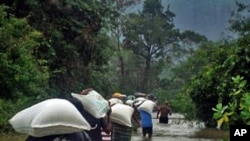The World Food Program says it is stepping up food assistance to hundreds of thousands of flood victims in Sri Lanka. It says two successive waves of flooding have led to widespread destruction of rice paddies and other field crops in the affected areas.
Less than a month after severe floods devastated provinces in Eastern and North central Sri Lanka, the country has been struck by a second wave of floods. The United Nations says the magnitude and impact of these floods are worse than the first, adding to the misery of tens of thousands of people who have been made homeless and have lost their livelihoods.
Official figures put the number of people affected at more than one million. This includes nearly 200,000 who are homeless and are living in temporary evacuation centers.
In January, the World Food Program provided rations to half a million-flood victims. WFP now has provided food aid to another 326,000 people and says it expects this number to increase to 500,000.
WFP spokeswoman, Emilia Casella, says 450,000 metric tons of rice paddies were damaged in January and now even more damage has been done to the rice harvest.
"This is of particular concern for the most vulnerable people there,” Casella said. “Our initial estimate was that at least 87,000 farming households would be affected by the damage to the rice crops and obviously that has a knock-on affect to the wider community of people who would be receiving that harvest food."
The United Nations reports unforeseeable rains are making it very difficult to deliver emergency assistance rapidly. It notes many reservoirs are overflowing and this is forcing people, once again, to flee their homes. It says roads are submerged and the lack of boats and helicopters is further complicating the relief effort.
Spokeswoman for the UN Office for the Coordination of Humanitarian Affairs, Elizabeth Byrs, says the health situation also is precarious.
"We are concerned because of the contamination of water sources and the wells, which have been already de-contaminated and been re-contaminated by the second wave of floods,” said Byrs. “And, we have this problem of health and sanitation issue and also there is a risk of acute respiratory infection and dengue outbreak. There are already several cases of vomiting, fever, which have been recorded."
Added to these woes is the lack of money to support the emergency relief operation. The United Nations issued a $50 million flash appeal in early January. Only $7.7 million has been received.
World Food Program Steps Up Food Assistance to Victims in Sri Lanka
- By Lisa Schlein




